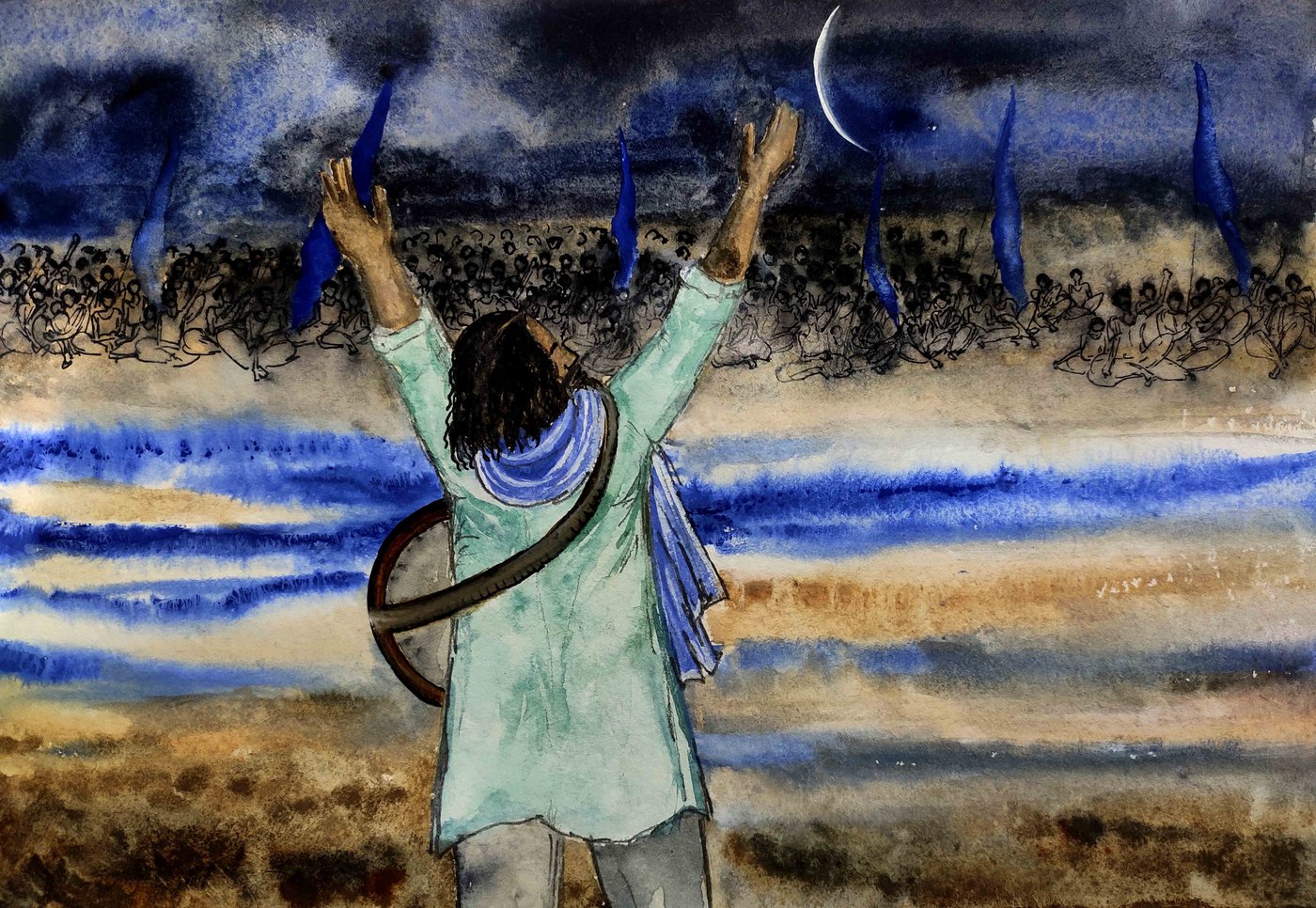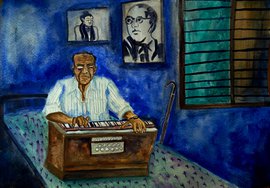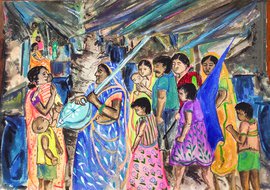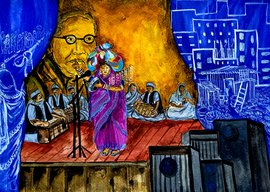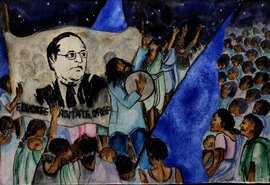After Dr. B.R. Ambedkar emerged on the horizon of Indian politics, shahirs , poet-singers, played a significant role in publicising and disseminating his movement for enlightenment in all corners of Maharashtra. They explained his life, his message and his role in the Dalit struggles – all in a language that anyone could understand. The songs they sang were the only university for Dalits in the villages, and it was through them that the next generation met Buddha and Ambedkar.
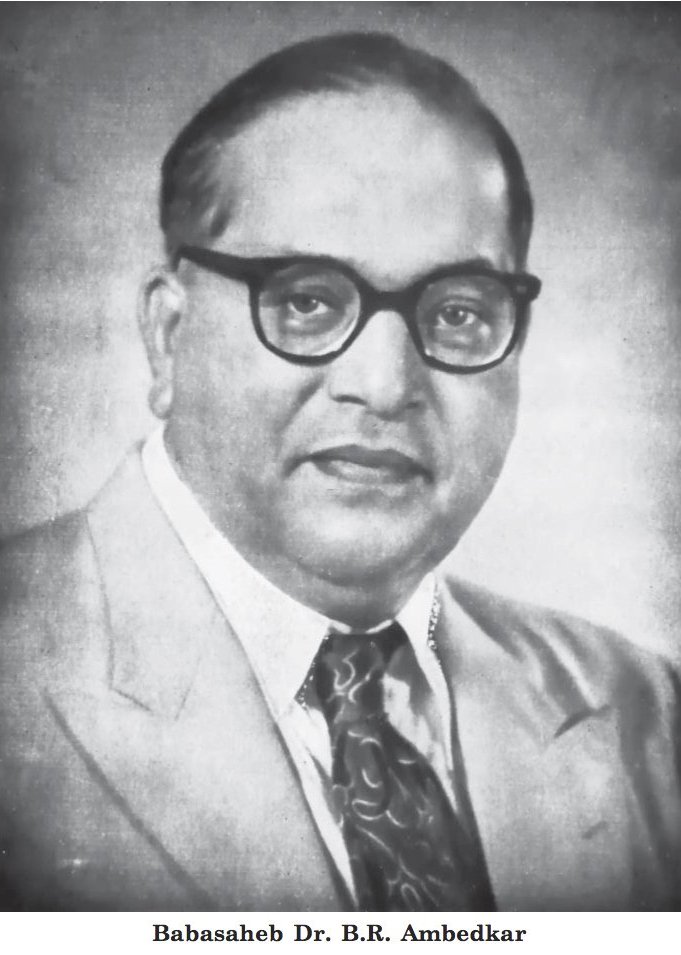
Atmaram Salve (1953-1991) belonged to a cohort of
shahirs
, who, in the turbulent ’70s, were introduced to Babasaheb’s mission through books. Salve’s life became all about Dr. Ambedkar and his message of liberation. His illuminating poetry shaped the two-decade-long Namantar Andolan – the movement to rename Marathwada University after Dr. Ambedkar, which had turned the Marathwada region into a battleground of caste wars. With his voice, his words, his
shahiri
, Salve carried the torch of enlightenment against oppression, walking the villages of Maharashtra on his two feet without any means. And thousands would gather to listen to Atmaram sing. He would say, “When the name of the university is officially changed, I will write Ambedkar’s name in golden letters on the university’s entrance arch.”
Shahir Atmaram Salve’s fiery words inspire Marathwada’s Dalit youth in their struggles against caste oppression to this day. Sumit Salve, a 27-year-old student from Phule Pimpalgaon village in Beed district, says “even an entire night and an entire day won’t be enough” to describe what Atmaram means to him. Paying homage to Dr. Ambedkar and Atmaram Salve, Sumit presents a stirring song by Atmaram, exhorting the listener to follow Ambedkar’s path and give up the old ways. Provoking his audience with the question “How long will you wrap yourself in the age-old blanket?” the
shahir
reminds us, “With the Constitution as his canon, your saviour Bhim broke the shackles of slavery”. Listen to Sumit sing the song.
घटनेच्या तोफानं
तुझ्या भीमबापाने
तोडल्या गुलामीच्या बेड्या
कुठवर या गोधडीत राहशील वेड्या?
लक्तरात सडले होते तुझे जिने
माणूस बनविले तुला त्या भीमजीने
ऐकून घे आज पिशा
काढ बुचडी दाढीमिशा
रानोबाच्या टंगाळ घोड्या
कुठवर या गोधडीत राहशील वेडया?
चार वर्णाचा होता गोधडीस रंग
जाळुनी भिमाने तिला बनवले अपंग
हा जगे बुद्धनगरीवर
हात दोन्ही डगरीवर
सुधरतील कशा या भीमवाड्या?
कुठवर या गोधडीत राहशील वेडया?
उवा तुझ्या गोधडीच्या शिरल्या जटात
म्हणून रानोबा घरी ठेविला मठात
नको आडण्यात शिरू
साळवेला कर तू गुरु
थांबव अप्रचाराच्या खोड्या
कुठवर या गोधडीत राहशील वेड्या?
With the Constitution as his canon
Your saviour Bhim
broke the shackles of slavery
How long will you wrap the age-old blanket around you?
Your life was in tatters
Bhimji transformed you into a human being
Listen to me, you fool
Stop growing your beard and hair
blind follower of Ranoba [a deity]
How long will you wrap the age-old blanket around you?
The blanket bore colours of the four
varna
Bhim burnt it and rendered it powerless
You live in Buddha
nagari
but want to be elsewhere
How will the Bhimwadi [Dalit
vasti
] see better days?
How long will you wrap the age-old blanket around you?
Lice from your blanket have infected your unkempt hair
You keep worshipping Ranoba in your home and
mutth
Leave the path of ignorance
Follow Salve as your guru
Stop misleading people, won’t you?
How long will you wrap the age-old blanket around you?
This video is part of a collection titled ‘Influential Shahirs, Narratives from Marathwada’, a project implemented by India Foundation for the Arts under their Archives and Museums Programme, in collaboration with People’s Archive of Rural India. This has been made possible with part support from Goethe-Institut/Max Muller Bhavan New Delhi.
